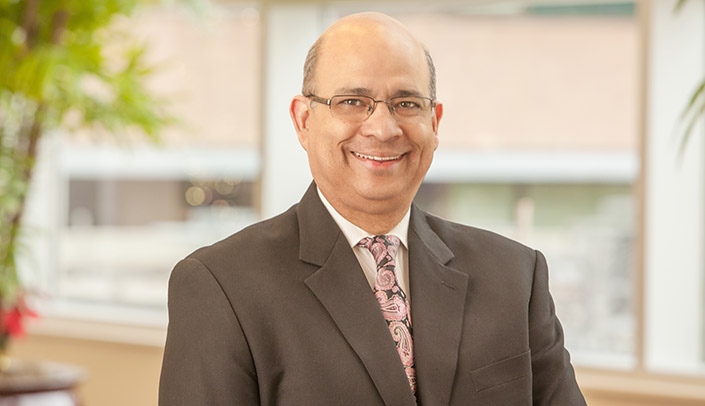Name: Ruben Quiros, MD
Title: Professor, UNMC Division of Pediatric Gastroenterology
Medical school attended: University of Panama School of Medicine
Location of residency/fellowship training:
- Pediatric residency, Hospital del Nino de Panama, Panama City
- Pediatrics residency, Thomas Jefferson University, Alfred I. duPont Hospital for Children, New Castle County, Delaware
- Fellowship, pediatric GI, UCLA – Mattel Children’s Hospital, Los Angeles
- Fellowship, pediatric transplant hepatology, UCLA – Mattel Children’s Hospital
What residency/fellowship program at UNMC are you serving as program director for? Pediatric gastroenterology and pediatric transplant hepatology
Number of trainees: Five
How long have you been the program director? 11 years
What made you choose to become the program director? I have always been interested in education. Since early in my career, I always enjoyed teaching residents and medical students. As soon as I came to UNMC, I saw how great an opportunity it was to become the program director for pediatric gastroenterology, as I like to pass along my knowledge to a new generation of health care providers. I have developed the philosophy from a quote someone once told me, “I will teach you what is not in the books.”
What challenges do you foresee in graduate medical education in the future? While technology has brought many advancements to the field, I think there also are challenges of adapting to the increase in technology. We have perceived answers at our fingertips, and information is rapidly available instead of having to use older methods of researching and searching out solid and concrete answers. Current trainees may feel that they already know it all because of how accessible and readily available Google, Web MD or any other information made available through this technology is. I think you may lose out on some of the experience of actually learning through this fast-paced world. I am worried that trainees may lose sight of what is really important and focus on the convenience of quick answers.
What are the strengths of your training program? We have several strengths in our program, but a few that stand out would be the diversity of my faculty in both knowledge and backgrounds. With that, they bring different clinical experiences and training. We also are lucky to work with such a large institution that we have a lot of access to research, which of course is crucial to progressing our medical field. Lastly, I would say we have a good volume of procedures that help adequately train our fellows. We take advantage of the simulation facility that also helps to train our fellows in procedural skills that they will need to become successful pediatric GI physicians.
List some accomplishments that you are proud of: Being someone who comes from a very small town (Penonome) in a small country, Panama, and being in the position that I am in today, as the chief of the division, the medical director of world-renowned pediatric liver/small transplant and intestinal rehabilitation programs. I am also the program director for two major programs here in the UNMC Department of Pediatrics, where I have had to develop and rebuild these programs from the ground up. These programs have graduated 11 fellows that are now practicing and training all over the nation as pediatric gastroenterologists.
Tell us three things about you that others may not know:
- I play guitar and percussion.
- I was a dancer in the Panamanian Folklore Dance Group that participated in international activities.
- My first job had nothing to do with health care. As a teenager, I started working in a bank where I pretty much did whatever needed done. You name it, I probably did it.
